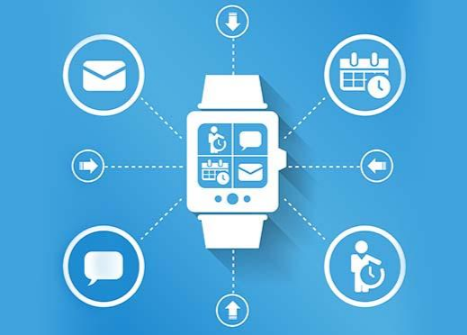
A recent Q&A session from The Wall Street Journal spotlighted the emerging usage of wearable electronic devices within the workplace. Many of these devices now offer new tracking capabilities designed to understand productivity and safety, allowing insurers to gather data on workers’ health indicators and habits.
Within the retail industry, wearables could be used to monitor employees for health and performance in the store, in the warehouse and at the company headquarters. However, further usage beyond the simple collection of data would more than likely raise concerns about privacy, especially when it comes to health.
The RTP editorial team weighs in on whether retailers should be able to require their employees to wear wearables, and debates the consequences of gathering employee data for business purposes.
Debbie Hauss, Editor-in-Chief: I think we’re still in the infancy of saturation of wearables tracking employee health and, as the Wall Street Journal article indicated, the prospect of this raises red flags regarding personal privacy. This is going to have to play out determined by a number of factors, including the specific job and whether or not the employee’s heart rate is relevant to their day-to-day job, for example. In most cases I believe it will need to be an opt in situation with full written disclosure by the employer regarding how they will collect and use the data. If employers believe this data will be important, then they will want to think about how to motivate their employees to participate, such as offering free membership to a fitness center or complimentary medical screenings.
Adam Blair, Executive Editor: The prospect of giving an employer (or any organization) the ability to track my activity and health indicators via a wearable device strikes me as wrong-headed on multiple levels. Even if it’s done on a “voluntary” or “opt-in” basis, there’s too much opportunity for coercion. A recent hire or someone desperately seeking a job will hardly be in a position to refuse such an offer. Tracking of health information, even if it’s done in an aggregated and anonymized fashion, is not only an invasion of privacy but seems like it would clash with HIPAA regulations fairly quickly. There are a few exceptions noted in the Wall Street Journal article, such as the use of wearable devices to track potentially unsafe environmental or working conditions (like the presence of radiation or breathable particulate matter). I’m not opposed to the use of wearables for location tracking purposes, particularly in a large warehouse or big box retail location, but the technology’s range should be limited to the employer’s physical plant. What people do on their own time is their own business.
Alicia (Fiorletta) Esposito, Content Strategist: I feel like this is a very complex argument that has many layers and “what-if” scenarios. This shouldn’t be a one-size-fits-all strategy that can be applied across all different types of organizations of all different sizes. Instead, it should vary depending on the business culture and vertical, size of employee base, their field of work/daily tasks, among other factors. For example, it may be extremely valuable if a personal trainer at a gym tracks his/her daily activities, or shows a client how many calories a workout could potentially burn. The medical benefits indicated in the article, such as tracking radiation, protection from accidents, etc., are also hard to ignore. There are two critical points, though, that emerged in this piece: transparency and accuracy. If you want to use wearables in your organization you need to have a high level of trust and communication among managers and team members. What’s in it for them? What value will they have out of giving you access to their data? With so many articles pointing to so-so accuracy of some of these tracking devices, though, businesses should be cautious if they plan to use this data as their single source of truth.
David DeZuzio, Managing Editor: While it is nice to think of an employer taking an honest interest in my health and overall well-being, let’s be serious. This seems more like an effort to disqualify people from employment and track their whereabouts throughout the day more than anything. Sorry, but this is where I pretty much draw the line. If an employer wants to track me, they should prepare to be bored, because sitting at a desk all day is not worth tracking in the slightest. Yes, it would be nice if they saw an impending heart attack and were able to warn me, but is that how this information is ultimately going to be used? Probably not. It is definitely something useful for someone who works in an area with radiation and particulates, but for retail employees and office settings? Pass. Track your products not your employees.
Glenn Taylor, Associate Editor: The debate here is interesting because we are seeing an increase in monitoring in fields such as professional sports. NFL players, for example, are monitored on performance and health measures during practices, to gather data on the workload their bodies go through on a day-to-day basis. Since it is part of their job, there is plenty of precedent for employers in other industries to consider wearables. With that said, I don’t necessarily believe employees of any company should be required to use wearables as part of their employment, particularly if the data gathered potentially violates the individual’s privacy. The one example the Wall Street Journal article brought up involving sleep quality is exactly the type of information an employer would likely benefit from knowing, but shouldn’t really dive into. Would it help them understand a few things about the employee? Possibly. But it also could lead the employer to jump to conclusions about the employee’s working habits that may have nothing to do with the quality of sleep itself.
Klaudia Tirico, Associate Editor: In my opinion, using the company budget to supply employees with wearable devices is just not worth the money. As The Wall Street Journal suggests, if the wearables are used to detect unsafe working environments in certain occasions, then I think that is an exception. But the article also made a great point about the danger of discrimination with employee wearables. If an employer sees that one employee slept better than another, and judges their potential sales performance based on the findings, that can lead to serious conflict. I would hope my employer doesn’t judge me based on how many hours I sleep at night because everyone works well in different circumstances. Making employees sport wearables to monitor their activity in and out of the office is just not OK in my book. David said it best: “Track your products, not your employees.” Hear, hear!






